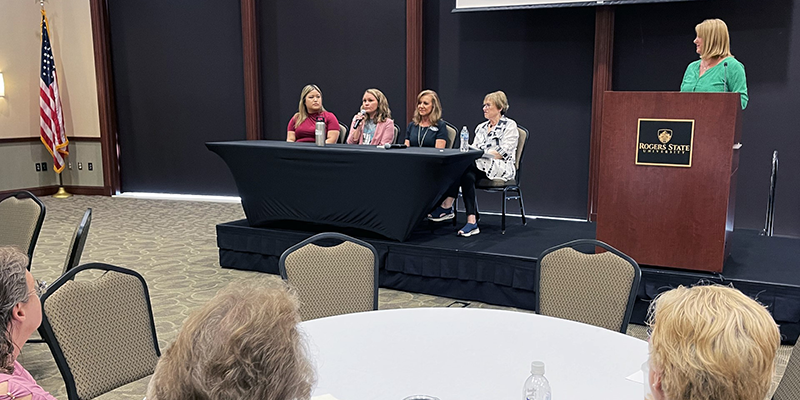
RSU hosted a panel discussion June 22 following the screening of the film “Resilience: The Biology of Stress and the Science of Hope.” Pictured, left to right: Heidi Pham, LCSW, eastern Oklahoma VA Health Care System; Jody Moore, executive director of Safenet Services; Layla Freeman, founder and CEO of Light of Hope; Gail Bieber, LCSW; and Dr. Michelle Taylor, director of RSU’s Master of Science in community counseling program (standing).
Rogers State University hosted a screening of a documentary on June 22 about the long-term effects of childhood stress and trauma.
The event was hosted by RSU’s Office of Counseling Services and the Master of Science in community counseling program, in partnership with the Northeast Workforce Development Board (NEWDB). The screening and discussion took place in the Dr. Carolyn Taylor Center on RSU’s campus in Claremore.
“Resilience: The Biology of Stress and the Science of Hope” is a KPJR Films-produced documentary about a biological syndrome called Adverse Childhood Experiences, or ACEs, caused by abuse, neglect and trauma that occur during childhood. The documentary screening was made possible by the Potts Family Foundation.
Caitlin Hendrex, RSU counseling services coordinator, greeted the guests and gave an overview of the morning. Michelle Bish, executive director of the NEWDB, also greeted guests and talked about the importance of the organizations and individuals present working together to improve our communities.
“Community conversations like this are critical so that we can impact change in northeast Oklahoma and even beyond,” Bish said. “I assure you that today is going to be a very meaningful day. You will be impacted by what you are going to hear through the film, but I think we also have a very strategic panel of guests that we have invited to come and be part of this conversation, in hopes that we can truly impact change in northeast Oklahoma.”
The film centers around research and case studies on Adverse Childhood Experiences (ACEs) and how those experiences impact various aspects of children’s lives, even throughout adulthood. These effects include not only mental but physical health and well-being. The film depicts numerous examples of doctors, schools, community organizations, social workers, etc., that are addressing the impact of ACEs in children and are making tremendous strides in helping children and adults heal from these experiences and thrive in their lives.
ACEs are broken into the following 10 categories of negative experiences during childhood: physical abuse; sexual abuse; verbal abuse; physical neglect; emotional neglect; a family member who is depressed or diagnosed with another mental illness; a family member who is addicted to alcohol or another substance; a family member who is in prison; witnessing a mother being abused; or losing a parent to separation, divorce or death.
For each category experienced during childhood, an individual receives a score of “1,” tallying up the total number of categories experienced to determine an ACE score.
Following the screening, Dr. Michelle Taylor, director of RSU’s Master of Science in community counseling degree program, facilitated a panel discussion with community stakeholders invested in reducing the onset and impact of ACEs. Panelists included Gail Bieber, LCSW (licensed clinical social worker), private practice in Catoosa; Layla Freeman, founder and CEO of Light of Hope in Claremore; Jody Moore, executive director of Safenet Services; and Heidi Pham, LCSW, eastern Oklahoma VA Health Care System.
The panelists discussed various ways that they and the organizations in which they serve are working in the community to help those facing adverse circumstances, trauma, mental health issues and more. They discussed how recognizing the impact of Adverse Childhood Experiences helps the process of healing for individuals and families as well as the process of educating the community on how to overcome ACEs in order to thrive in the future.
For more information about the film and to watch the trailer, visit https://kpjrfilms.co/resilience.
To learn more about the Master of Science in community counseling degree program at RSU, visit www.rsu.edu/mscc or contact Dr. Michelle Taylor at 918-343-7835 or [email protected].
For more information about RSU’s Office of Counseling Services and the services available to RSU students, visit www.rsu.edu/counseling, call 918-343-7845 or email [email protected].
